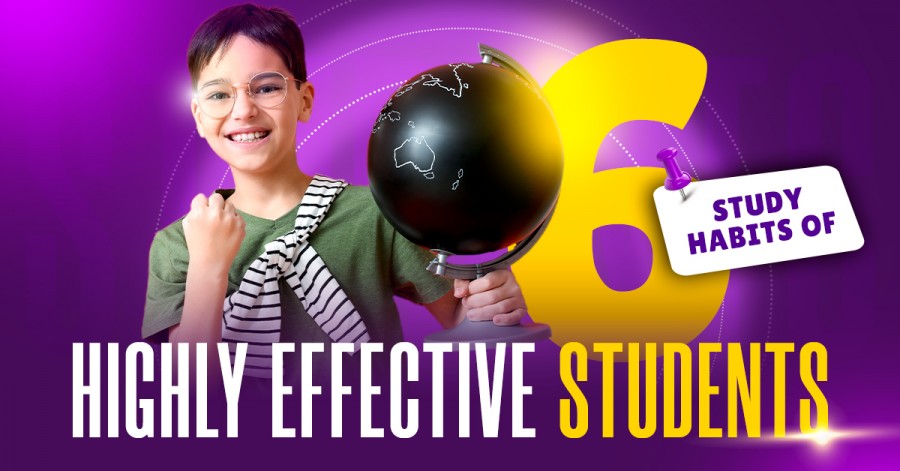6 Study Habits of Highly Effective Students
Published 24 November 2021 at 02:38
Tickikids Blog Singapore > Digest > 6 Study Habits of Highly Effective Students

The Habits of the Best Students in Class
Learning how to study smarter, not harder, is the key to becoming an effective student. Educational experts say that an hour or two of studying a day is usually enough to make it through high school with satisfactory grades. But as your child grows, with more things to do per day and more hours needed for other activities, he or she needs to learn how to study smarter.
You May Also Like: Best Tuition Centres in Singapore
Most successful students achieve their success by applying effective learning techniques which have turned into their habits after several years of practice and repetition. These techniques may seem like a secret in achieving A’s that only achiever students know, but these can be easily done by anyone as long as they have the motivation to study. Good study habits and positive motivation are the keys to achieving the best results. The following are the top 6 study tips and habits employed by highly successful students.
Review Notes After Class
The most important step to retain new information from lectures and discussions is to review and study them after class. The concepts are still fresh in mind and can be recalled easily. Reorganizing notes will also help understand the information more since notes that are written during lectures may be cut or shortened. This could also be the opportunity to list down questions from concepts that may not be clear during the class. Additionally, use Google Slides templates to create organized and visually engaging study materials for effective review.

Create a Schedule
The first thing to do before starting to study for upcoming quizzes and exams is to keep track of important dates and deadlines. This will help sort out thoughts and give emphasis to the things that should be given higher priority. Clearly list down the activities and requirements that need to be accomplished so that none of them will be forgotten. This will also prevent procrastination since tasks are organized and will be done earlier before the deadline.
Recommended for You: Best Student Care Centres in Singapore
Find a Comfortable Study Area
In order to be able to focus on studying difficult subjects, a clean and quiet place is necessary. A comfortable studying environment translates to more productivity since there are fewer disturbances and leads to higher concentration. The lighting and ventilation should also be at their optimal settings so that it would be easier to focus on studying since there are no distractions. Too warm or cold rooms may distract the senses, as well as too dark or too bright lighting. However, excessive comfort may lead to drowsiness and affect the productivity of the student. Thus, it also helps to avoid setting up study areas in places that are meant for resting. Try to keep the resting areas and the study areas separate to create a feeling of purpose for the study area.

Ask for Help
Learning is a process that includes feedback and insight from other individuals. It helps to consult other people when stuck on a difficult or confusing lesson. By seeing the concepts from a different perspective, it helps in creating a new solution or approach to the current problem.
When studying, make sure to have access to several resources such as classmates, friends, mentors, online academic videos, and tutorials to gain different perspectives and new information regarding the lesson. There are also online websites, like My GRE Exam Preparation, that provide academic materials, study guides, practice exams, and other references that can be helpful to students.
Recommended for You: Educational Trends 2025
Make a Study Plan
Creating a study plan is an effective method of studying because it organizes the tasks to be accomplished and sets a timeline for learning the lessons given by the teachers. A study plan should first identify the key concepts needed to be tackled and studied by the students. The order of learning the concepts must be arranged systematically so that the learning process is continuous and progressive. This way of studying avoids the instances of backtracking lessons and it also builds the fundamental knowledge of the student regarding the subject.
Allotting time schedules for studying, resting, and taking up leisure activities is also included in the study plan. A person can only maintain their concentration continuously for a specific amount of time. This time must be the allotted time for studying to maximize the efficiency of the student. Breaks for resting and doing other activities must also be included in the study plan. By finding the perfect balance between studying, resting, and leisure, the mind will be ready for studying after taking much-needed breaks.
Study to Learn, Not to Pass
This tip focuses more on the mindset that a student has when it comes to their education. The main goal in studying is to learn the lessons given by the teachers and fully understand the concepts included in the lesson. If the students focus more on passing their subjects instead of prioritizing learning the lesson itself, it adds more pressure to the students to perform well and it may affect their academic performance. By focusing more on learning and understanding the lesson, the students will be free of any pressure and it will greatly help them learn at their own pace, and the results of this will be reflected in their grades. By studying to learn and not studying to pass, the students can achieve scores that reflect their excellent understanding of their lessons.